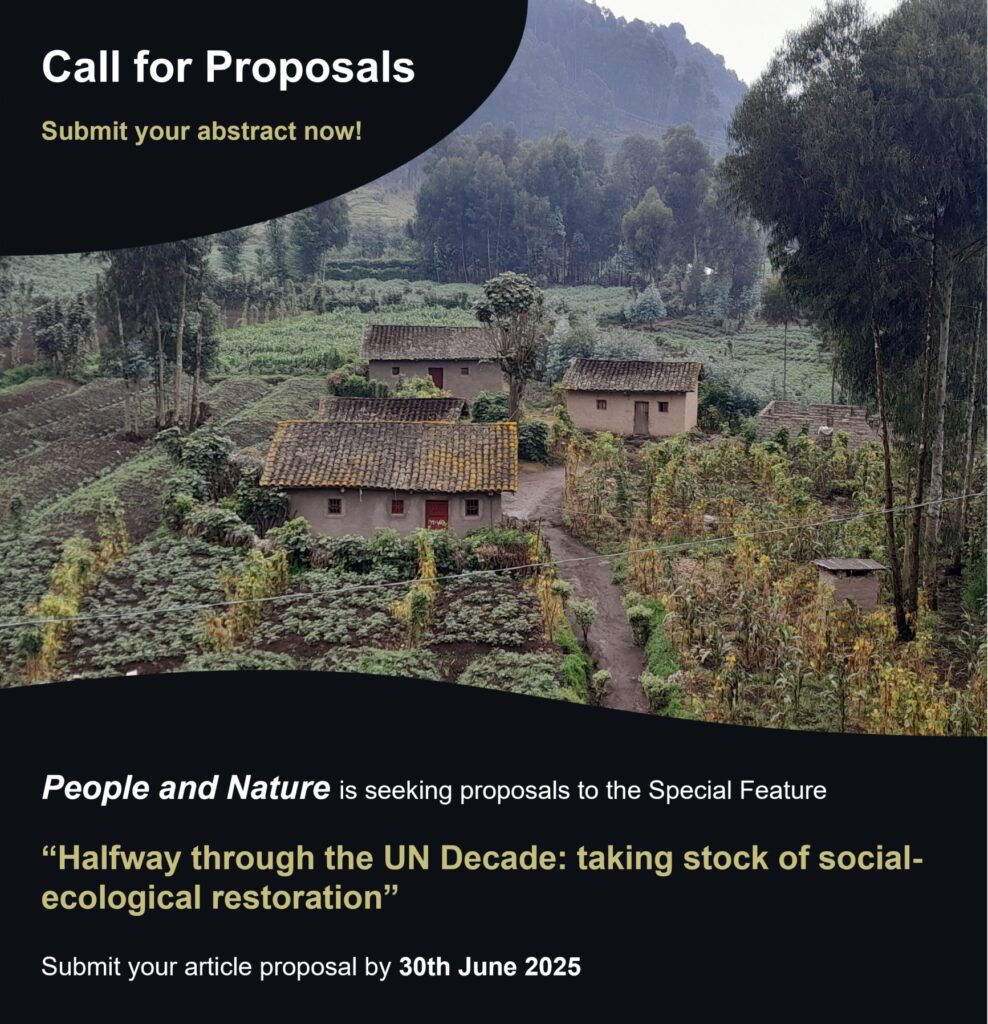Special Feature in People and Nature: “Halfway through the UN Decade: taking stock of social-ecological restoration”
Call for Proposals: Taking stock of social-ecological restoration People and Nature is seeking proposals to the Special Feature “Halfway through the UN Decade: taking stock of social-ecological restoration” Over the past…

Call for Proposals: Taking stock of social-ecological restoration
People and Nature is seeking proposals to the Special Feature “Halfway through the UN Decade: taking stock of social-ecological restoration”
Over the past decades, ecosystem restoration efforts aiming to prevent, halt, and reverse the loss of nature and enhance human well-being have accelerated worldwide. Global initiatives such as the Bonn Challenge and associated regional partnerships have sought to restore diverse ecosystems at multiple spatial scales. The declaration of 2021-2030 as the UN Decade on Ecosystem Restoration has redoubled global efforts towards the development of restoration science, policy, and practice.
Despite commendable achievements towards climate action, biodiversity, and livelihood targets, ecosystem restoration initiatives have also fallen short of projected goals. Research suggests that many restoration projects are mismatched with social realities, ecological contexts, or regulatory and technical capacities on the ground. Recent scholarship has documented detrimental ecological and social outcomes, including landscape homogenization, failure to rebuild complex (social-)ecological interactions, and lost resource access of local communities. Moreover, mounting evidence reveals injustices and ethical dilemmas inherent to many market-based restoration finance mechanisms, actors’ unequal power and decision-making capabilities in global restoration networks, and the outsourcing of restoration projects from countries disproportionately exploiting natural resources to landscapes in the “Global South”.
As the halfway mark of the UN Decade approaches, People and Nature invites restoration scientists and practitioners to reflect on their diverse perspectives and experiences to date, with particular emphasis on how social and ecological objectives and elements interact in various restoration contexts. The time is ripe to take stock of the social-ecological outcomes of restoration, to reflect on the values and worldviews underpinning established restoration approaches, and to forge improved ways forward.
All contributions should be in scope for the Special Feature as outlined here, as well as the journal itself. The full People and Nature scope can be found HERE.
People and Nature particularly welcomes contributions which:
- Critically appraise the contextual conditions and mechanisms that underpin restoration outcomes, in social-ecological terms.
- Disentangle the many “re-“ terms on the ecological side of restoration (e.g., reclamation, remediation, restoration, rewilding), and their appropriateness for restoration goals.
- Empirically investigate neglected “re-“ questions on the social side of restoration (e.g., on reconnecting people and landscapes, the social reproductions of power dynamics, or resettlement and restitution in restoration landscapes).
- Scrutinize diverse interests and influences of restoration actors interacting across scales.
- Compare how restoration interventions have taken shape in different parts of the world, and who and what benefits from restoration in these contexts.
- Present analytically or reflect conceptually on novel research approaches, innovative practices, and emerging questions to guide the next five years of the UN Decade.
Please submit article proposals by 30th June 2025.
The deadline for article submission will be 31st December 2025.
Edited by: Dr. Tobias Plieninger (University of Göttingen and University of Kassel), Dr. Laura Kmoch (University of Göttingen), Marina Frietsch (Social-Ecological Systems Institute/Leuphana University), Prof. Dr. Joern Fischer (Social-Ecological Systems Institute/Leuphana University), Dr. Harry Fischer (Swedish University of Agricultural Sciences), Emily Sigman (Dartmouth College)